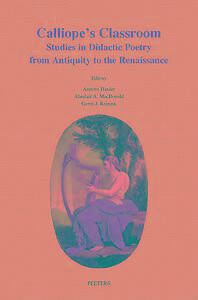
- Retrait gratuit dans votre magasin Club
- 7.000.000 titres dans notre catalogue
- Payer en toute sécurité
- Toujours un magasin près de chez vous
- Retrait gratuit dans votre magasin Club
- 7.000.0000 titres dans notre catalogue
- Payer en toute sécurité
- Toujours un magasin près de chez vous
Calliope's Classroom
Studies in Didactic Poetry from Antiquity to the Renaissance
Harder M.A., Macdonald A.A.
Livre relié | Anglais
60,00 €
+ 120 points
Description
The present volume contains twelve new essays on didactic verse, with a broad time-sweep ranging from the most ancient literature (Sumeria) through to the early-modern age (seventeenth-century England). Considered collectively, the contents illustrate the transmission of this important literary kind from Ancient to Modern times, and from east to west, from south to north. The Romantic age led to the lyric being seen as the dominant poetical mode, and today it has become almost axiomatic to view the chief function of poetry as the articulation of the thoughts and emotions of the individual; a concomitant assumption is that the essential quality of poetry is the aesthetic. However, in other cultures, and in earlier times, things were very different, and the didactic was long accorded a secure place as one of several prominent literary modes. While it is difficult to give a precise definition of the didactic, it may be said to be characteristically concerned with knowledge and wisdom, where the latter term inclines toward moral and religious instruction, and the former toward information both practical and encyclopaedic. The present contributions deal with the functioning of didactic verse in such widely diverse areas as: education in school; mnemotechnics; rhetoric, style and composition; farming; grammar; the natural world; cultural identity; liturgy and worship; aetiology; philosophy; politics; intertextuality; man as microcosm; the training of the soul; gender awareness. Truly, the classroom presided over by Calliope, the chief of muses, is no arid intellectual forcing-house but rather a place where the resources of rhetoric, learning and imagination are felicitously combined in the training of the individual mind and the betterment of society in general.
Spécifications
Parties prenantes
- Auteur(s) :
- Editeur:
Contenu
- Nombre de pages :
- 334
- Langue:
- Anglais
Caractéristiques
- EAN:
- 9789042918085
- Date de parution :
- 31-12-07
- Format:
- Livre relié
- Format numérique:
- Genaaid
- Poids :
- 706 g

Les avis
Nous publions uniquement les avis qui respectent les conditions requises. Consultez nos conditions pour les avis.






